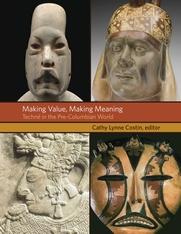Christina Campbell
Cathy Costin (Craft production, division of labor, Inka imperial strategies, ceramics, textiles)
Cathy Costin studies the strategies used by the Inka to consolidate their pre-Columbian empire and the effects of those strategies on conquered peoples. She is currently working on three interrelated projects:
- The reorganization of craft production. This project investigates how the Inka reorganized ceramic and textile production among subjugated populations. Comparisons are made between the two types of goods -- which served different purposes in the empire -- and between the the sociopolitically and technologically complex Chimu of the North Coast and the smaller scale Wanka chiefdom of the central highlands.
- The construction and expression of identity. This project investigates how material culture -- especially ceramics and textiles -- was used to express social identity in the multi-ethnic, highly stratified Inka empire.
- The effects of Inka conquest on labor. This project investigares the direct and indirect effects of Inka economic policies, including taxation and demand for specific types of goods.
 Dr. Costin has also recently edited a volume entitled Making Value, Making Meaning: Techné in the Pre-Columbian World (Harvard University Press 2016) which explores how materials and production processes of ancient people contribute to the symbolic, social, and political importance of commonplace and special objects.
Dr. Costin has also recently edited a volume entitled Making Value, Making Meaning: Techné in the Pre-Columbian World (Harvard University Press 2016) which explores how materials and production processes of ancient people contribute to the symbolic, social, and political importance of commonplace and special objects.
Gisela Lanzas (Water politics, international development, Mexico, Panama)
Chin-hsin Liu (bioarchaeology, bone chemistry, life history, social complexity, human-environment interaction)
Michael Love (Early social complexity, ceramic analysis, household archaeology, Mesoamerica)
Michael Love is conducting research on political cycling and state formation on the Pacific coast of Guatemala, working at the sites of La Blanca and El Ujuxte through the examination of changes in household economy and ritual. He has received grants from the National Science Foundation, the National Endowment for the Humanities, the Wenner-Gren Foundation for Anthropological Research, the National Geographic Society, the Foundation for the Advancement of Mesoamerican Studies, among others. His major publications include "Early Complex Society in Pacific Guatemala: Early Settlements and Chronology of the Río Naranjo, Guatemala," , "Incidents of Archaeology in Central America and Yucatán," (edited with Marion Popenoe de Hatch and Héctor Escobedo", and "The Southern Maya in the Late Preclassic (edited with Jonathan Kaplan).
Suzanne Scheld (Urban space and place, informal economies, consumption, globalization, West Africa and U.S.)
Suzanne Scheld is conducting research on the politics of public space in Dakar, Senegal and urban U.S. In Dakar, she is examining how consumption and urban place-making processes intersect in markets, tourist sites, and neighborhoods. In the U.S., she is researching place-making in popular urban beaches such as Jones Beach in New York and Zuma Beach in Malibu. Her major publications include a co-edited volume with Jennifer De Maio and Minte Woldeamanuel, Sustainability in Sub-Saharan Africa: Problems, Perspectives, and Prospects (Lexington Books 2018), Rethinking Urban Parks: Public Space and Cultural Diversity (University of Texas Press 2005) with Setha Low and Dana Taplin, “Youth Cosmopolitanism: Clothing, the City and Globalization in Dakar, Senegal” in The Fashion Reader (edited by Linda Welters and Abby Lillethun), and “Veiled Racism in the Street Economy of Dakar's Chinatown in Senegal” (with Lydia Siu) in Street Economies in the Urban Global South (edited by Karen Tranberg Hansen, Lynne Milgram and Walter Little).
James Snead (Historic archaeology, historic landscapes, roads, history of archaeology)
Wendy Giddens Teeter (Cultural resources protection; Heritage management; Cultural Resource Law & Policy; Gabrielino Cultural Ecology & Landscapes; Mesoamerican Zooarchaeology & Ethnohistory); Museum Studies
Wendy Teeter co-directs the Pimu Catalina Island Archaeology Project along with Desiree Martinez (Tongva) and Karimah Kennedy-Richardson, which focuses on the dynamics of village life and the movement of people over the more than 8,000 years of history of Pimu (Catalina Island) and its relationships with other islands and the mainland. The project is supported in part by CSUN's yearly summer field school that has been awarded scholarships through the Register for Professional Archaeologists and American Anthropology Association as well as the Society for American Archaeology for 2012 and 2013 field seasons. They have a forthcoming book chapter entitled, "Human Occupation and Landscape Alterations on Catalina Island, California," in Small Islands, Big Implications: California's Channel Islands and their Archaeological Contributions Edited by Jennifer Perry and Christopher Jazwa. University of Utah Press.
